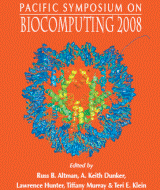Local Reliability Measures from Sets of Co-Optimal Multiple Sequence Alignments
Giddy Landan, Dan Graur
Pac Symp Biocomput. 2008;:15-24.

Abstract
The question of multiple sequence alignment quality has received much attention from developers of alignment methods. Less forthcoming, however, are practical measures for quantifying alignment reliability in real life settings. Here, we present a method to identify and quantify uncertainties in multiple sequence alignments. The proposed method is based upon the observation that under any objective function or evolutionary model, some portions of reconstructed alignments are uniquely optimal, while other parts constitute an arbitrary choice from a set of co-optimal alternatives. The co-optimal portions of reconstructed alignments are, thus, at most half as reliable as the uniquely optimal portions. For pairwise alignments, this irreducible uncertainty can be quantified by the comparison of the high-road and low-road alignments, which form the cooptimality envelope for the two sequences. We extend this approach for the case of progressive multiple sequence alignment by forming a large set of equally likely cooptimal alignments that bracket the co-optimality space. This set can, then, be used to derive a series of local reliability measures for any candidate alignment. The resulting reliability measures can be used as predictors and classifiers of alignment errors. We report a simulation study that demonstrates the superior power of the proposed local reliability measures.
[Full-Text PDF] [PSB Home Page]